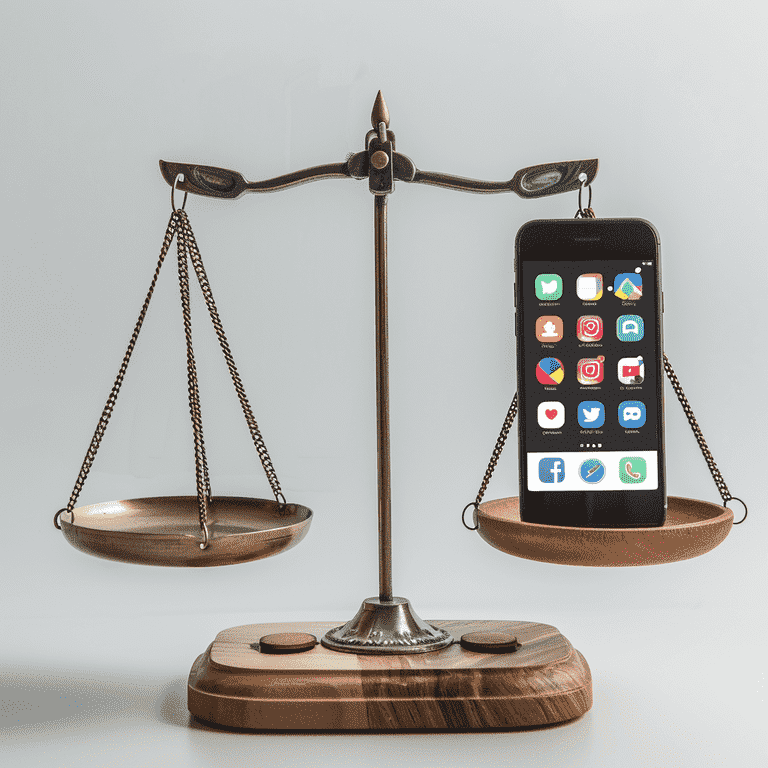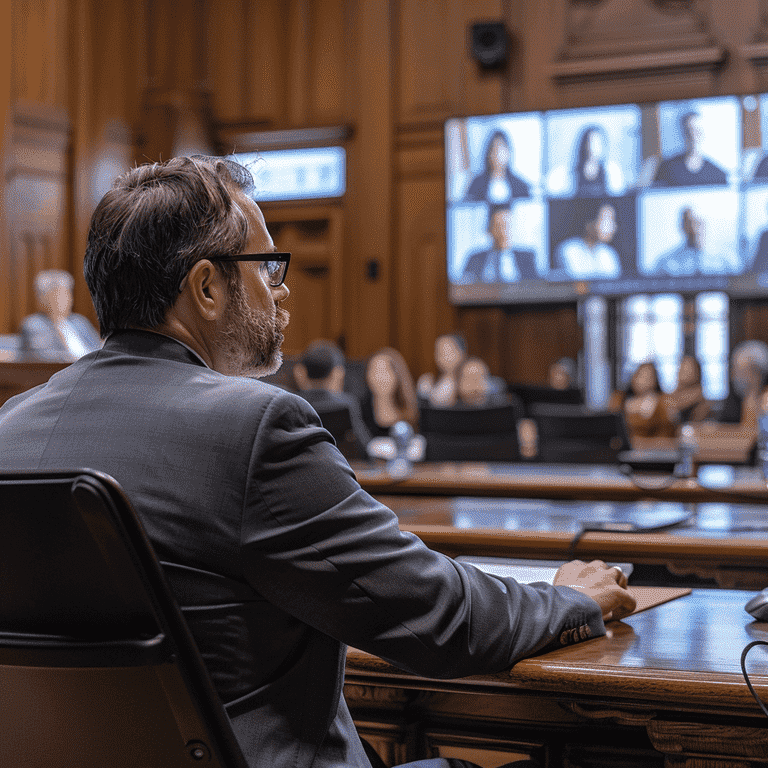In recent decades, social media has transformed how we communicate and share our lives. Moreover, this transformation has also reached the courtroom, where social media evidence is increasingly crucial in legal cases, including those in Las Vegas. Therefore, this guide will explore the ins and outs of social media evidence, its admissibility, and its impact on various legal scenarios.
Understanding Social Media Evidence
Definition and Types of Social Media Evidence
Social media evidence encompasses various forms of digital content shared on social platforms. Here are the main types:
- Public Posts: Any content that is publicly accessible on social media profiles.
- Private Messages: Direct messages exchanged between users on platforms like Facebook Messenger or Instagram Direct.
- Photos and Videos: Visual content shared on platforms such as Instagram, Snapchat, and TikTok.
- Check-ins and Location Data: Information about a user’s location shared via check-ins or geotagged posts.
- Metadata and Timestamps: Background data that includes details like the date and time a post was made, which can be critical for establishing timelines.

Relevance of Social Media Evidence in Legal Cases
Criminal Cases
Social media evidence plays a pivotal role in criminal cases. Here’s how:
- Examples: Social media posts can provide alibis, reveal motives, or show criminal intent.
- Impact: Consequently, evidence from social media can significantly influence the outcomes of criminal trials, potentially affecting verdicts and sentencing.
Civil Cases
In civil litigation, social media evidence can be equally impactful. It’s often used in the following types of cases:
Divorce and Family Law
- Infidelity and Misconduct: Social media can reveal evidence of infidelity or other behaviors impacting divorce proceedings.
- Child Custody: Posts showcasing parenting behaviors can influence custody decisions.
Personal Injury Cases
- Activity Level Evidence: Social media posts can either support or refute claims of injury by showing the plaintiff’s activity levels.
- Timeline Establishment: Posts can help establish a timeline of events leading up to and following an incident.
Employment Disputes
- Workplace Conduct: Posts or messages may provide evidence of misconduct or harassment in the workplace.
- Hiring and Firing Decisions: Social media profiles can sometimes be scrutinized to support hiring or termination decisions.

Admissibility in Las Vegas Courts
Legal Standards for Admissibility
For this type of evidence to be admissible in court, it must meet several legal standards:
- Relevance: The evidence must directly relate to the case at hand.
- Authenticity: There must be proof that the social media content is genuine and has not been tampered with.
- Reliability: The evidence must be credible and trustworthy.
- Non-prejudicial Nature: The evidence should not unfairly prejudice the jury against one party.
Rules of Evidence Specific to Nevada
Nevada courts follow specific rules for admitting this evidence. Furthermore, these rules ensure that only relevant and reliable evidence is considered during trials. Understanding these rules is essential to use or challenge social media evidence in court effectively.
Collecting and Preserving
Methods of Collecting Evidence
Gathering social media evidence correctly is vital. Incorrect methods can lead to challenges in court. Here are some common and effective ways:
- Screenshots and Screen Recordings: Screenshots or recording the screen can capture content precisely as it appears.
- Data Downloads and Exports: Many social platforms allow users to download their data, which includes posts, messages, and other interactions.
- Third-Party Tools and Services: Specialized tools can help collect and archive social media content systematically.
Importance of Preservation
Preserving social media evidence is just as important as collecting it. Proper preservation ensures that the evidence remains unaltered and credible. Here’s why it matters:
- Avoiding Spoliation: Spoliation is the destruction or alteration of evidence. It can lead to sanctions or case dismissals.
- Ensuring Integrity and Authenticity: Preserved evidence maintains its original form, which helps in proving its authenticity.

Challenges and Pitfalls
Privacy Concerns
Social media is personal, and privacy concerns are significant. Balancing these concerns with the need for evidence can be tricky.
- Legal and Ethical Considerations: Lawyers must navigate privacy laws and ethical guidelines while collecting evidence.
- Balancing Privacy with Evidentiary Needs: It’s essential to respect privacy while ensuring that critical evidence is not overlooked.
Authentication Issues
Authentication issues can arise, and addressing them is necessary for admissibility.
- Verifying the Source and Content: It is vital to confirm who created the content and that it has yet to be altered.
- Overcoming Challenges of Fake Profiles and Altered Content: Detecting and proving the existence of fake profiles or edited content can be challenging but is necessary for credibility.
Chain of Custody
Maintaining a transparent chain of custody is essential for any evidence, including social media.
- Documenting the Evidence Trail: Keeping detailed records of who handled the evidence and when ensures transparency.
- Ensuring Proper Handling and Storage: Proper handling and secure storage prevent evidence from being tampered with or damaged.
Role of Social Media in Divorce Cases
Evidence of Infidelity or Misconduct
Social media can be a goldmine for evidence in divorce cases. It often reveals behaviors that one might want to hide.
- Examples and Case Studies: Posts, photos, and messages can expose infidelity or other misconduct. For example, check-ins at unusual locations or tagged photos with someone else can be incriminating.
Impact on Child Custody and Support Decisions
Significantly, social media posts can influence decisions about child custody and support.
- Demonstrating Parenting Behaviors and Fitness: Posts showing irresponsible or risky behaviors can affect custody decisions. Conversely, posts highlighting positive interactions with children can support a custody case.
- Financial Disclosures and Asset Identification: Social media can reveal hidden assets or income. Posts about expensive purchases or lavish lifestyles can contradict financial statements.
Legal Strategies for Using Social Media Evidence
Indeed, using this type of evidence effectively requires strategy and legal know-how.
- Effective Legal Strategies: Primarily, developing a strategy for discovery and presenting evidence in court are key. Attorneys must know what to look for and how to use it persuasively.
- Building a Strong Defense: Meanwhile, challenging the admissibility of evidence and providing context or alternative explanations can help counter potentially damaging digital content in court.

Legal Strategies for Using Social Media Evidence
How Attorneys Can Effectively Use Social Media Evidence
Attorneys must be strategic when using social media evidence. Here’s how they can make the most of it:
- Developing a Strategy for Discovery: Identify the types of evidence needed. Use subpoenas and discovery requests to obtain this information legally.
- Presenting Evidence in Court: Clearly explain the relevance of the evidence. Use visuals, like printouts or digital displays, to make a compelling case. Ensure all evidence is authenticated and meets admissibility standards.
Defending Against Social Media Evidence
Defending against social media evidence requires a proactive approach. Here are some strategies:
- Challenging Admissibility: Argue that the evidence does not meet legal relevance, authenticity, or reliability standards. Highlight any potential privacy violations.
- Countering with Context or Alternative Explanations: Provide context that can mitigate the impact of the evidence. For example, explain that a controversial post was taken out of context or was a joke.
Case Studies and Real-World Examples
High-Profile Cases
Real-world examples help illustrate the power of social media evidence. Here are a few high-profile cases:
- Case 1: Divorce Case Involving Infidelity: In a notable divorce case, social media posts and messages provided clear evidence of infidelity, significantly impacting the court’s decision.
- Case 2: Criminal Case with Facebook Posts: In a criminal case, Facebook posts helped establish the defendant’s whereabouts, leading to a conviction.
- Case 3: Employment Dispute with Tweets: An employment dispute was resolved using tweets that showed discriminatory behavior by a supervisor.
Lessons Learned and Precedents Set
These cases teach important lessons and set precedents:
- Importance of Early Evidence Collection: Collecting social media evidence early in a case can be crucial. Delays can result in lost or altered evidence.
- Need for Comprehensive Evidence Review: Thoroughly reviewing social media evidence helps uncover all relevant information. This can be pivotal in both prosecution and defense.
- Balancing Privacy and Legal Needs: Courts must balance individuals’ privacy rights with the need for relevant evidence. This ongoing challenge influences how social media evidence is handled.

Breaking It All Down
Social media evidence is decisive in legal cases, especially in Las Vegas courts. Understanding its types, relevance, and challenges can help you navigate your case more effectively. Knowledge and strategy are essential whether you’re using this evidence or defending against it. As social media continues to evolve, so will its role in the courtroom.

Frequently Asked Questions
What types of social media platforms can provide evidence in court?
Social media evidence can come from any platform where users share content, including Facebook, Twitter, Instagram, Snapchat, TikTok, LinkedIn, and even dating apps like Tinder. Any digital platform where information is shared can be a source of evidence.
How can social media evidence affect divorce settlements?
Social media evidence can impact divorce settlements by revealing infidelity, hiding assets, or showing behavior that influences child custody decisions. Posts, messages, and photos can provide insight into a person’s actions and character, which may affect the court’s ruling.
What are the risks?
Using social media evidence comes with risks such as privacy concerns, challenges in authenticating the evidence, and potential accusations of destruction if the evidence is mishandled. So it’s crucial to follow proper legal procedures to mitigate these risks.
Can deleted social media posts still be used as evidence?
Deleted posts can sometimes be recovered and used as evidence. They can be retrieved through data recovery methods or by subpoenaing the social media platform. However, this success depends on the platform’s data retention policies and the deletion timing.
What should I do if I find damaging evidence against me?
If you find damaging online evidence against you, consult your attorney immediately. They can help you develop a defense strategy, which may include challenging the admissibility of the evidence or providing context that mitigates its impact.
How do courts verify the authenticity of online evidence?
Courts verify authenticity by examining metadata, timestamps, and the content’s context. They may also require testimony from witnesses who can confirm the origin and integrity of the evidence. Proper documentation and a transparent chain of custody help establish authenticity.
Can private messages be used as evidence in court?
Yes, private messages can be used as evidence in court. These messages, whether from Facebook Messenger, WhatsApp, or other platforms, can provide crucial information about the parties involved. However, they must meet the same relevance, authenticity, and reliability standards as other evidence.
How do online posts impact child custody cases?
In child custody cases, online activity can show a parent’s behavior, lifestyle, and interactions with the child. Posts demonstrating responsible parenting can support a custody claim, while evidence of irresponsible or risky behavior can harm it.
Is it legal to collect social media evidence without the other party's knowledge?
Collecting public social media evidence is generally legal, but accessing private content without permission can violate privacy laws and ethical guidelines. Therefore, It’s best to use legal methods, such as discovery requests or subpoenas, to obtain private social media evidence.
What steps should be taken to preserve social media evidence?
To preserve social media evidence, take clear screenshots or screen recordings, download and export data if the platform allows, and use third-party tools for systematic collection. Ensure the evidence is stored securely and maintain a detailed chain of custody to prevent destruction.
How do social media platforms respond to subpoenas for evidence?
Social media platforms typically have legal teams that handle subpoenas. They may require specific legal procedures to be followed and will review requests to ensure compliance with privacy laws and policies. The response time and extent of data provided can vary by platform.

Additional Resources for You from The Rosenblum Allen Law Firm.
Our lead attorney, Molly Rosenblum Allen, Esq., has also created several other resources to assist you in your time of need. Explore these resources for more information and legal support:
- Criminal Defense Attorneys: Comprehensive defense services for various criminal charges.
- Las Vegas DUI Lawyer: Effective representation for DUI cases in Las Vegas.
- Domestic Violence Lawyer Las Vegas: Dedicated legal support for domestic violence cases.
- Drug Possession Lawyer: Specialized defense for drug possession charges.
- Sex Crimes Attorney: Professional legal help for sex crime accusations.
- CPS Defense Attorney: Defense against child abuse and neglect charges.
- Misdemeanor Lawyer: Legal assistance for misdemeanor offenses.
- Las Vegas Warrant Defense Attorney: Defense services for outstanding warrants.
- Las Vegas Probation Violation Attorney: Representation for probation violation cases.
- Theft Crime Defense Lawyer: Defense strategies for theft-related charges.
- Kidnapping Lawyers: Experienced defense for kidnapping accusations.
- Juvenile Defense Lawyers: Legal support for juvenile offenders.
- Firearms Lawyer Las Vegas: Effective defense for firearm-related charges.
These resources provide valuable information and effective legal support to help you navigate your legal challenges effectively.

Offsite Resources for You
American Bar Association (ABA): Offers extensive resources and articles on legal topics, including guidelines for using social media evidence in court.
FindLaw: Provides a wealth of legal information, including how social media evidence can be used in various types of legal cases.
NOLO: Offers legal guides, books, and articles on different aspects of law, including the implications of social media evidence.
Justia: A comprehensive legal resource providing case law, codes, regulations, and legal articles, including those related to social media evidence.
Avvo: Connects you with attorneys and provides extensive legal advice, including information on using social media in legal contexts.
LawHelp.org: Provides free legal aid and resources for various legal issues, including evidence collection and social media’s role in legal cases.
LegalZoom: Offers legal document services and resources, including information on the legal aspects of social media use.

A Special Message from Our Lead Attorney, Molly Rosenblum Allen, Esq

Thank you for taking the time to explore our resources. I hope you found the information helpful and informative. If you have any questions or need assistance with your legal situation, please don’t hesitate to call me and my team at (702) 433-2889. We are here to help you get the ball rolling on your case.
Best regards,
Molly Rosenblum Allen, Esq.






